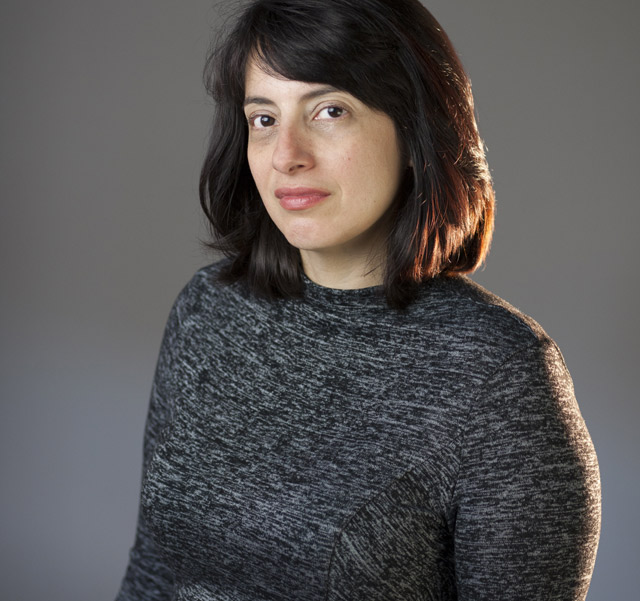
Rebecca Papucaru lives in Sherbrooke, Quebec, just outside of Montreal. The Panic Room, nominated for the A.M Klein Award for Poetry, was released this fall by Nightwood Editions. The Panic Room explores generational contrasts, the complexities of identity and selfhood, memory and family. In this interview, Papucaru discusses the makeup of some poems from her debut collection, and discusses her writing process.
When did you begin working on the poems that would make up The Panic Room?
Related Posts
Many of these poems have had long periods of gestation: for example, I started “Group Therapy” in 1998, finishing it in 2016. I don’t know whether to be proud (tenacity, lengthy apprenticeship to my craft) or ashamed (lazy, easily distracted). I started the poem during a creative writing course with A.F. Moritz at the University of Toronto. Originally, the subject was an event at the university’s Women’s Center. I remembered the tampons and coffee on a table, and being asked to describe my state of mind with one word. I can’t remember what that one word was. Afterwards, we were sent out to the dorms to discuss consent with female students who paid us little attention.
I went into the experience expecting instant friendship based on my feminist principles, but instead found it isolating, even alienating. It was a lot like my job at the time, calling up strangers and asking them to complete a survey on yogurt or cars. The next semester I started group therapy, again on campus, which I liked much better. But again, no deep friendships were formed; there seemed to be some unspoken rule forbidding us from socializing outside of our usual meeting room. Or maybe I am just lousy at making friends. But the idea stayed with me; I have been in therapy in some form most of my adult life. I wanted to consider, in some small way, the intensity of those relationships, and how completely dependent they are on context. Prof. Moritz liked the first version enough to read it to the class and some of my self-doubt dissipated, enough to allow myself the idea that I might make a poet one day.
What went into the memorable poem “Said Saint-George to the Maiden: Wait in the Car”?
My mother kept her forbidden books in my parents’ bedroom, on top of their armoire. I reached my full adult height at age 12, so it was a half-hearted attempt at censorship, which my parents were generally against. I read Larry Clark’s novel, Faggots, and The Joy of Sex. I read Anais Nin and The Women’s Room and Fat is a Feminist Issue.
Eventually, I was found out by my father. I remember him smiling as he took a forbidden book from my hands and, to my surprise, placed it back on top of the armoire. I’m grateful now for their lax attitude towards books, and culture in general. With their tacit encouragement I read everything I could, and what better gift is that to a writer?
You take on identity and personal family narrative in a provocative way in “Cottage Country / “Take It or Leave It” Could you reveal a bit of how you formed these pieces?
On my father’s side, I’m first-generation Canadian, but on my mother’s side, I’m third-generation. On my father’s side, I could count one aunt, one uncle, one cousin, and one grandfather, all in Toronto. On my mother’s side, too many relatives to count, and this despite her being an only child. But because our small family was in Montreal, not Toronto, I wasn’t close to any of them, except my mother’s parents. So when I write about my family, I have more of a licence to fictionalize, and I do. I’ll never have their lived experiences anyway, whether it’s Bucharest in the 1940s or Toronto in the 1950s. In a way, nothing is off-limits to me.
Who are some of your influences?
Long list: Carl Dennis, Anne Sexton, Sylvia Plath, Maxine Kumin, Robert Lowell, Elise Partridge, David Donnell, A.F. Moritz, Lorna Crozier, Molly Peacock, Jacob Scheier, George Elliott Clarke, Patricia Young, Deborah Garrison, Jane Shore, Karen Solie, Philip Larkin, and many others I will remember at some later date.
Can you talk about how autobiographical the poem “I’ll Start Tomorrow” may or may not be?
This began as a short poem based on a story my mother told me about my birth. In the hospital, when the nurse brought me to her all swaddled up, she briefly mistook me for a loaf of bread, and not just any bread, but sourdough, which she loved. I don’t know how long the hallucination lasted, not long enough for my mother to ask for a knife and some chopped liver, certainly, but in that first draft that’s what she does.
From there the poem expanded, every pun intended, to the body type I’ve inherited, and the conflicted pride I feel about having successfully fought it off for most of my adult life like some hereditary disease. Then I visited the church of St. Médard in Paris and learned of the young girls who converged there to deny their fleshly appetites. All these ideas of bodily denial came to a head, so to speak, and the poem took shape. The title, of course, is the dieter’s refrain, usually said while in the midst of their last supper, a farewell feast of forbidden foods. Yet it’s bodily appetite that brings us into this world, and shouldn’t that be respected?